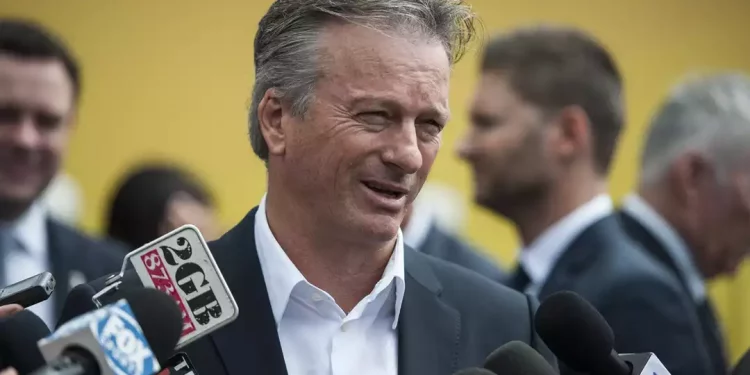Steve Waugh, who is sure that the Test team’s transition depends on it, has accused George Bailey, Australia’s head selector, of rarely having the appetite to make difficult decisions.
Steve Waugh, one of the most taciturn personalities from Australia’s golden age, questioned how the country’s aging population is being handled during a rare media appearance on Wednesday.
Bailey then questioned what they were supposed to do while elder players were still playing and reaffirmed that he and his panel were prepared to make difficult decisions.
There is only one player under 30 in Australia’s 15-man selection for the opening Ashes Test, despite the team’s recent success in rebuilding.
Usman Khawaja, another opener, will reach 39 next month, making David Warner the sole player to retire in recent years.
Nathan Lyon turns 38 this month, and Quicks Mitchell Starc, Scott Boland, and Josh Hazlewood will all be 35 or older by the end of the summer.
Steve Waugh, one of the greatest captains in Australian history, was present at the SCG on Tuesday to accept the MCC Waterford Crystal Ashes Trophy.
Before the final significant change to the Test team, which included the dropping of Ian Healy and Mark Waugh in prior years, Steve Waugh retired in 2004 at the age of 38.
When asked how he thought the Test side’s recent transition seemed, Steve Waugh responded that selectors had to step in and oversee the procedure.
“George Bailey’s going to have to make some tough calls,” Steve Waugh stated.
“I believe he has previously demonstrated that he occasionally lacks the appetite for that, therefore he will need to take the initiative alongside the other selectors.
“Some of the batsmen are getting on in life, and the bowlers are in their 30s. Every team naturally does that. All you need to do is make sure that no three or four players leave at the same moment. The team is severely weakened by that. Therefore, they must just ensure that it is a transition rather than a complete one.
Steve Waugh stated that the issue should be removed from the players’ control when asked whether it meant putting a finger on their shoulder to suggest they retire.
“I’d like to see the selectors pick the sides, not the players,” Steve Waugh stated. “A number of players have been taking sides and arguing over who ought to be on the team lately. The selectors are responsible for that.
Following Khawaja’s suggestion last week that Matt Renshaw and Marnus Labuschagne join him in Australia’s top three, which would have put pressure on someone else, Steve Waugh made his remarks.
When questioned by the media on Wednesday, Bailey defended players who back their state teammates, claiming that the panel was never swayed by those opinions.
Additionally, he insisted that he and his panel, which included Tony Dodemaide and Andrew McDonald, had discovered other methods of nurturing new talent.
“My question back, is there a tipping number once a player hits an age you move them on?” Bailey stated. Should it be the case for every member of the team who is currently playing? Is that the most crucial requirement?
“That’s not to suggest you don’t know the team’s age distribution, but we consider every test to be significant. One-day cricket is used as an entry point for Australia A tours, which bring players to the subcontinent and get them in and around Test squads.
Bailey also supported Khawaja’s experience and justified his selection, pointing out that the opener’s 232 in January in Sri Lanka was one of only two scores above 50 in his previous 26 Test innings.
Since Warner’s retirement, Australia has also not decided who will be his opening partner; Steven Smith initially filled the job.
Last summer, young players Nathan McSweeney and Sam Konstas were given opportunities, and Labuschagne or Jake Weatherald were probably going to open the first Ashes Test in Perth.







